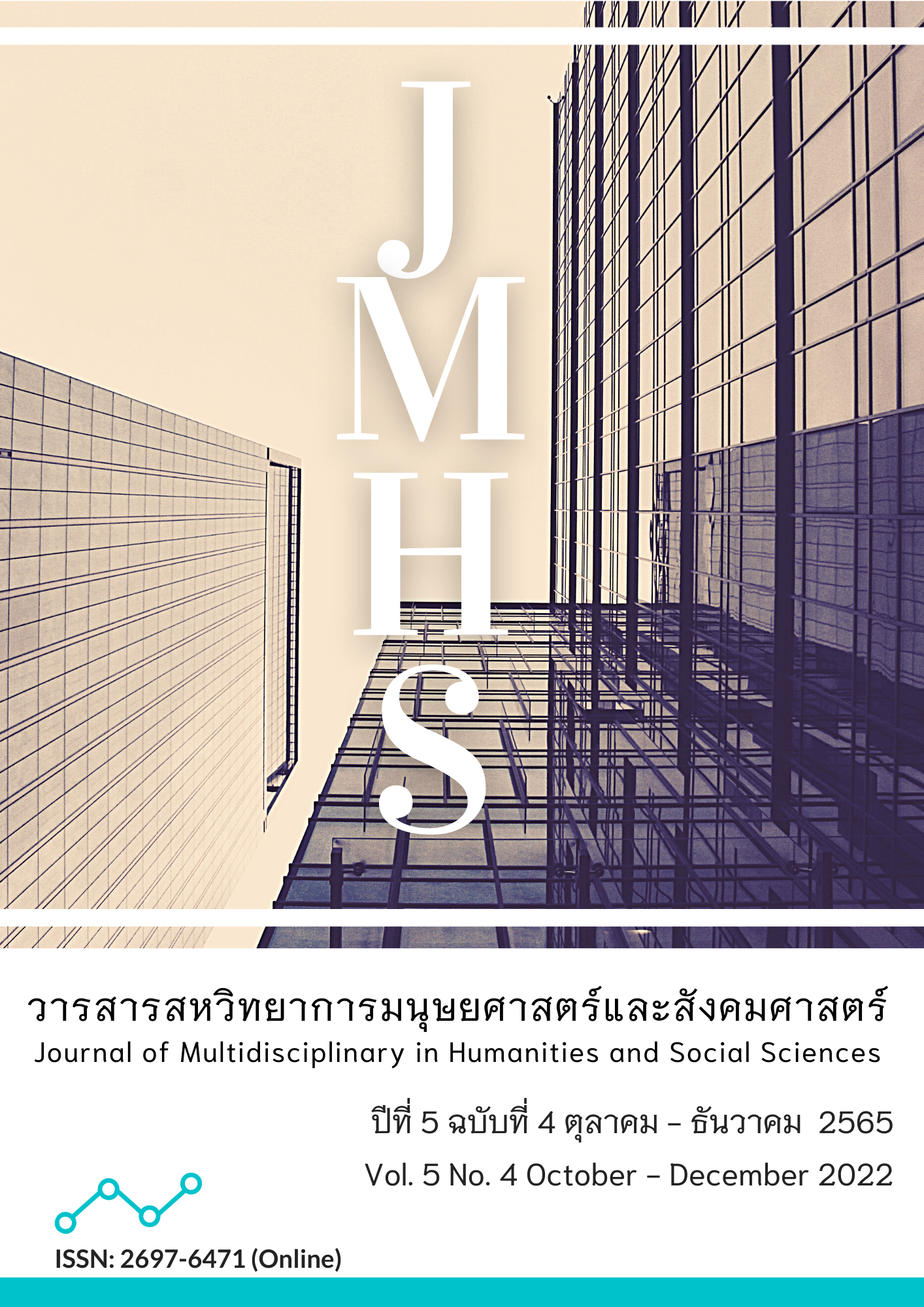Effectiveness of Learning Management Model Enhances Analytical Reading and Writing Abilities Judgment of Grade 5 Students
Main Article Content
Abstract
Reading is a crucial foundation in learning and developing wisdom of people in society, particularly analytical reading which enhances learners to improve thinking capability, behaviors, value of lifestyles which adjusts themselves being a valuable life as well as to support readers enable to solve problems and develop successful quality of life. While critical writing is the ability to compose content that is relevant to the point or title and to describe documents, circumstances in content according to supporting references, or to discuss an issue where a conclusion is reached reasonably and reliably. This article aimed to study the efficiency of learning management enhancing analytical reading and critical writing competencies in Thai subject of primary level in Grade 5 students, and to compare the competencies of the skills between a group whose the learning management model was provided and a general one offered. This research was conducted through an R&D approach in which the efficiency of the learning model was presented via sampling groups including thirty students from two classes of 5/1 and 5/2 at Namon Songkhrau School, 1st semester, Academic Year 2022. The tested group was selected using the cluster sampling technique. It was found that students whose the learning management model was offered, the competencies also rose more than the group whose general learning management with 0.5 significant. In both groups whose general learning management and model were provided, the competencies were 24.80, 18.37, and 34.33, 26.00, respectively.
Article Details

This work is licensed under a Creative Commons Attribution-NonCommercial-NoDerivatives 4.0 International License.
Views and opinions appearing in the Journal it is the responsibility of the author of the article, and does not constitute the view and responsibility of the editorial team.
References
กระทรวงศึกษาธิการ. (2551). หลกัสูตรแกนกลางการศึกษาขั้นพื้นฐาน พ.ศ. 2551. กรุงเทพฯ: กระทรวงศึกษาธิการ.
เกรียงศักดิ์ เจริญวงศ์ศักดิ์. (2547). การคิดเชิงวิเคราะห์. (พิมพ์ครั้งที่ 4). กรุงเทพฯ: ซัคเซสมีเดีย.
ทิศนา แขมมณี. (2554). ศาสตร์การสอน องค์ความรู้เพื่อการจัดกระบวนการเรียนรู้ที่มีประสิทธิภาพ. กรุงเทพฯ: จุฬาลงกรณ์มหาวิทยาลัย.
สมชาย หอมยก. (2550). ภาษาไทยเพื่อการสื่อสาร. ปทุมธานี: มหาวิทยาลัยราชภัฏวไลยอลงกรณ์.
สุนันทา มั่นเศรษฐวิทย์. (2552). ความรู้ทั่วไปเกี่ยวกับการอ่านจับใจความ. เอกสารการสอนชุดวิชาการอ่านภาษาไทย หน่วยที่ 1-8. นนทบุรี: มหาวิทยาลัยสุโขทัยธรรมาธิราช.
อัจฉรา ประดิษฐ์. (2549). กระบวนการส่งเสริมการอ่านที่ได้ผลสำหรับเด็กประถมศึกษา ช่วงชั้นที่ 1 และ 2. กรุงเทพฯ: สำนักงานอุทยานการเรียนรู้ (TK park).
Baroody, A.J. (1998). Reasoning and communicating, K-8, helping children think mathematically. New York: Macmillan.
Billups, N.Z. (2006). An analysis of the impact of America’s choice program on critical thinking and writing skills of selected fifth grade student(A Dissertation for the Degree of Education). Fielding Graduate University.
Blume, S. (2009). The artificial ear. In The Artificial Ear. Rutgers University Press.
Bruner, J.S. (1974) Beyond the Information Given. London: George Allen & Unwin.
Dewey, J. (1910). Science as subject-matter and as method. Science, 31(787), 121-127.
Duit, R. (1996). The constructivist view in science education-What it has to offer and what should not be expected from it. Investigacoes em Ensimo de Ciencias, 1(1), 40-75.
Holton, J.A. (2007). The coding process and its challenges. The Sage Handbook of Grounded Heory, 3, 265-289.
Johnson, D.W., & Johnson, R.T. (1987). Research Shows the Benefits of Adult Cooperation. The Educational Leadership, 45(3), 27-30.
Johnson, D.W., & Johnson, R.T. (1990). Cooperative Learning and Achievement. In S. Sharan (Ed.), Cooperative Learning: Theory and Research (pp. 23-37). New York: Praeger.
Johnson, D.W., & Johnson, R.T. (1994). Learning Together and Alone. Cooperative, Competitive, and Individualistic Learning. (4th ed.). Edina, Minn.: Interaction Book Company.
Joyce, B., & Weil, M. (2000). Models of Teaching. (6th ed.) Boston: Allyn and Bacon.
Larson-Knight, B. (2002). Leadership, culture, and organizational learning. In K. Kemp, Jerrold E. (1985). The Instructional Design Process. New York: Harper & Row.
McGuire, J. K., Anderson, C. R., Toomey, R. B., & Russell, S. T. (2010). School climate for transgender youth: A mixed method investigation of student experiences and school responses. Journal of Youth and Adolescence, 39(10), 1175-1188.
Moshman, D. (1994). Reason, reasons and reasoning: A constructivist account of human rationality. Theory & Psychology, 4(2), 245-260.
Ruesseler, M., & Obertacke, U. (2011). Teaching in daily clinical practice: how to teach in a clinical setting. European Journal of Trauma and Emergency Surgery, 37(3), 313-316.
Siegel, H. (1991). The Generalizability of Critical Thinking. Educational Philosophy and Theory, 23(1), 18-30.
Slavin, R.E. (1990). Co-operative learning: Theory, research and practice. Prentice Hall, Englewood Cliffs.
Slavin, R.E. (1993). Ability grouping in the middle grades: Achievement effects and alternatives. The Elementary School Journal, 93(5), 535–552. https://doi.org/10.1086/461739
Slavin, R.E. (1994). Educational Psychology. (4th ed.). New York: Allyn & Bacon.
Sternberg, R.J. (2003). A Broad View of Intelligence: The Theory of Successful Intelligence. Consulting Psychology Journal: Practice and Research, 55(3), 139–154.
Thorndike, E.L. (1917). Reading as reasoning: A study of mistakes in paragraph reading. Journal of Educational Psychology, 8(6), 323-332.
Walsh, J.A., & Sattes, B.D. (2005). Quality questioning: Research-based practice to engage every learner. Thousand Oaks, CA: Corwin.


